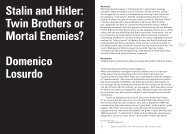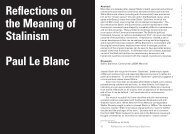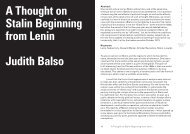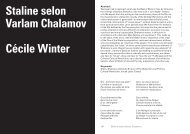adrian
adrian
adrian
- No tags were found...
You also want an ePaper? Increase the reach of your titles
YUMPU automatically turns print PDFs into web optimized ePapers that Google loves.
cites Ludwig Wittgenstein’s statement that, “A serious and goodphilosophical work could be written consisting entirely of jokes.”My suggestion for how to read Hegel’s Logic could be construed asinvolving a reversal of this Wittgensteinian assertion: The Science ofLogic (or other versions of the Logic, such as the first volume of theEncyclopedia) amounts to a long sequence of jokes delivered in theform of a serious and good philosophical work (further support for thiscan be found in Ernst Bloch’s reflections on “Hegel and Humor” 119 ).In both Less Than Nothing and Žižek’s Jokes, Žižek denies that thevery beginning of the Logic (i.e., the initial triad of Being, Nothing, andBecoming) really is a beginning. However, as I highlighted during theopening of this essay, the Žižek specifically of Less Than Nothing claimsthat “Determinate Being”/“Being-there” (das Dasein), the immediatesuccessor-moment to Becoming in “The Doctrine of Being,” indeed isto be understood as the actual start of Hegelian Logic after the falsestarts of its opening trinity. That is to say, Žižek limits “the beginning’simmediate self-sabotage” in Hegel’s Science of Logic and EncyclopediaLogic to these texts’ literal beginnings with the Being-Nothing-Becoming triad. Not only does this leave him exposed to the objectionsthat the likes of a Henrich or Pippin would raise to treating any momentwhatsoever of “The Doctrine of Being” as the proper starting point ofthe Logic—it is less than optimally consistent with and buttressing ofthe specifically dialectical materialist version of Hegelian philosophyaimed at by Less Than Nothing.This leads directly to my second above-expressed assertionregarding the three distinct varieties of beginnings in Hegel’sframework, with each one enjoying its own mode of precedence/priorityvis-à-vis the other two. As with Jacques Lacan’s Borromean knot,the Hegelian System is a configuration whose existence and integritydepends upon all three of its dimensions as equally indispensableconstituents, this arguably being part of what is at stake in someof Hegel’s (often opaque) remarks about syllogistic structures. 120Of course, the Encyclopedia, as articulating the core of HegelianWissenschaft, is structured by two basic organizing divisions, a twopartand a three-part division: first, a two-part division between Logikand Realphilosophie; and, second, a three-part division between, on119 Bloch 1970, pp. 136-140.CRISIS&CRITIQUE#3the one hand, Logik and, on the other hand, Realphilosophie as dividedinto Naturphilosophie and Geistesphilosophie (i.e., the three divisionsfamiliar in the form of the three volumes of the Encyclopedia, namely,Logic, Philosophy of Nature, and Philosophy of Mind). Stated roughlyand quickly, my idea is that Hegel’s three beginnings correspondapproximately to the divisions of the Hegelian system as follows:metaphysical (Logic), material (Philosophy of Nature), and historical(Philosophy of Mind, including Phenomenology—both ontogeneticand phylogenetic histories are involved in mindedness and likemindedness).The Phenomenology of Spirit—this first systematic work of themature Hegel defensibly can be read as a massive dialectical processof-eliminationargument in which all non-Hegelian presuppositions(embodied in the Phenomenology’s myriad figures/shapes ofconsciousness) dialectically eliminate (qua sublate) themselves—provides the pre-history leading up to the presuppositionless initiationof the Logic. Given both that Hegel is no metaphysical realist and thathe distinguishes between the logical and the real (as per the divisionbetween Logik and Realphilosophie), the Logic then can be construedas spelling out the dialectical-speculative network of concepts andcategories making possible all Realphilosophie precisely as knowledgeof the Real (any and every knowing of Nature or Mind [als Geist]necessarily relies directly upon at least some of the constellationsdelineated in the Logic). However, this making possible is donenot in the epistemological manner of Kant’s subjectively idealisttranscendental, but, instead, in the ontological fashion of Hegel’sabsolute idealist Idea (Idee) qua the identity-in-difference between theobjectively real as well as subjectively ideal dimensions of conceptsand categories (with, as I have shown already at some length, conceptsand categories indeed being both objectively real as well as subjectivelyideal for Hegel). Hence, the intelligibility of all things real, be theynatural or mental (again, als geistige), is made possible by them alwaysalreadybeing formed in and of themselves along lines traced by theLogic.Nonetheless, the structures and dynamics of the Logic do notmagically float in the rarified air of a mysterious, eternal time-beforetime(despite a famous Hegelian passage misleadingly suggestingthis 121 ). They exist only in and through the natural and spiritual realitiesCRISIS&CRITIQUE#3120 Hegel 1991c, §187 (p. 263); Hegel 2008, §188-189 (pp. 197-198).121 Hegel 1969a, pp. 49-50.406 “Where to Start?: Robert Pippin, Slavoj Žižek...407“Where to Start?: Robert Pippin, Slavoj Žižek...






